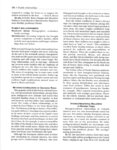1 - 25 of 10
| Creator | Title | Description | Subject | Date | ||
|---|---|---|---|---|---|---|
| 1 |
 |
Yaffe, Joanne | Assessing procedural descriptiveness: rationale and illustrative study | Procedural descriptiveness refers to the extent to which the activities defined in a procedure are complete and specific. Procedures used in research or human service that are poorly described raise important questions such as whether the procedures can be replicated or generalized and, in the case ... | Procedural descriptiveness | 1987 |
| 2 |
 |
Yaffe, Joanne | Behaviorism, social learning, and exchange theory | Behaviorism focuses on learning and the way in which behavior is shaped by its antecedent conditions and consequences. In rejecting mentalistic constructs such as mind, consciousness, and other internal processes, behaviorism stresses the importance of studying observable behavior rather than pheno... | 2006 | |
| 3 |
 |
Barusch, Amanda | Depressive symptoms in the frail elderly: physical and psycho-social correlates | The elderly who suffer from chronic illness are at unusually high risk of depression and depressive symptoms. This study was conducted to describe the prevalence of depressive symptoms in a sample of chronically-ill elders and to examine the relationship between physical illness and depression, bot... | Physical correlates; Psycho-social correlates | 1999 |
| 4 |
 |
Barusch, Amanda | Family relationships | With increased longevity, family relationships have become both more complex and more enduring. At the end of the twentieth century, four-generation and even five-generation families were not uncommon, and with longer life comes longer lifelong relationships, such as marriage. Advanced age presents ... | 2000-01-01 | |
| 5 |
 |
Yaffe, Joanne | Hypermedia computer-based education in social work education | Hypermedia computer-based education (CBE) is an emerging information technology that makes possible user-directed, nonsequential exploration of, and interaction with, information presented through a variety of media including text, animation, graphics, sound, and video. | Computer-based education | 1994 |
| 6 |
 |
Wen, Ming | Immigrant perceptions of discrimination in health care: the California Health Interview Survey 2003 | The 2002 Institute of Medicine (IOM) report Unequal Treatment summarized research on racial and ethnic disparities in health care defined as "racial or ethnic differences in the quality of healthcare that are not due to access-related factors or clinical needs, preferences, and appropriateness of i... | Health care; California health interview survey; Health disparities; Healthcare disparities | 2006 |
| 7 |
 |
Barusch, Amanda | Intergenerational relations in contemporary China: descriptive findings from Shanghai | With over one billion people, China accounts for nearly a quarter of the world's population. It also has the largest population of elderly (60 and over) living under one government (approximately 80 million). These elderly make up approximately 8 percent of China's population (Banister, 1984). In th... | 1991 | |
| 8 |
 |
Barusch, Amanda | Self-concepts of low-income older women: not old or poor, but fortunate and blessed | This article examines the extent to which low-income older women define themselves in stigmatizing terms, then explores the strategies they use to preserve a positive sense of self. Instead of considering themselves "old" or "poor," the sixty-two women interviewed defined themselves as "fortunate" a... | Low-income older women; Stigmatizing terms; Positive thinking | 1997 |
| 9 |
 |
Barusch, Amanda | Serving older men: dilemmas and opportunities for geriatric care managers | Geriatric care settings are essentially feminine. Most of the clients (or patients) are women, as are most of the care managers and care providers. Further, these settings are characterized by an "ethic of care," most compatible with a feminine world view. Clearly geriatric care is not specifical... | 2000 | |
| 10 |
 |
Barusch, Amanda | Social security is not for babies: trends and policies affecting older women in the United States | In the first year of the new century, over a million American women officially entered the ranks of "the elderly" by reaching their 65th birthday (U.S. Bureau of the Census, 1999). What can they expect of government policy? To what extent will the nation's economic support systems respond to their n... | Income security; Shifting fertility patterns; Labor force participation | 2001-01-01 |
1 - 25 of 10
